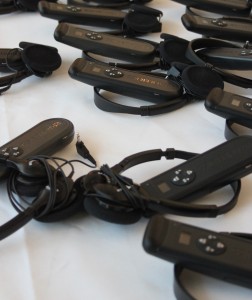Five tips to survive a plenary session
Thanks to the establishment of a new negotiating body last December, those attending the UN climate talks now have the chance to endure five consecutive closing plenaries. Plenary sessions can be the host of epic debates between the major players (remember the interaction between EU and India in the last hours of the COP17 in Durban). However, during intersessional sessions, plenary sessions are rather unexciting as most of the real discussions take place either in closed informal meetings or in an emerging form of diplomacy called “huddles” (involving a negotiating technique closely related to what people would call “group hug”). In order to support delegates going through these lengthy sessions, our team gathered a few tips from senior negotiators.
 Tip 1 - Selective listening
Tip 1 - Selective listening
We can not emphasize this enough: a translation device is the essential accessory to survive a plenary. However, it is to be used only during the interventions made by some specific groups of countries. To operate it adequately, please follow these few steps: (1) disconnect the device from the black case, (2) plug your own MP3 device, (3) select appropriate music and press play when appropriate, (4) stare convincingly at the dais to pretend that you are actually following the negotiations (try not to node in rhythm).
This technique is used by many delegations: more delegates can indeed be spotted using the headset of the translation device when the Umbrella group intervenes (despite them speaking in English) than during any other interventions even if those are delivered in other languages. This can be explained by the fact that this coalition has made it a specialty to avoid making meaningful contributions to the discussions for many years, mainly repeating the statements drafted half a decade ago.
Tip 2 - Fruitful reading
When a long list of speakers line up to merely repeat pre-established positions, delegates might consider focusing their focus on more productive tasks such as reading informative materials. We strongly advise against considering the Daily Programme as part of your readings, as this document stubbornly insists in suggesting that sessions will take place only between 10am and 6pm against any existing empirical data. Instead, reading the ECO newsletter provided by the Climate Action Network might be a more effective way forward. You can also access those here in case you do not have the paper version.
Tip 3 - Stimulate your brain cells
Considering that the debates in the plenary sessions are usually no-brainers, it is highly recommended that you do persist in stimulating your cerebral activity with appropriate exercises. Sudoku would be most appropriate in this respect. By working on Sudoku grids, delegates can reconstruct a personal relationship with numbers and train in filling tables with concrete numbers. This activity is particularly indicated for negotiators from Australia, New Zealand, Canada, USA, Russia and Japan as all of them have somehow failed to provide the numbers under the Kyoto Protocol (delegates from European countrie need to learn that only the adequate number can lead to a winning grid, not just any number).
Tip 4 - Stay updated
Have you not dreamed of having to read a 140-characters long summary of these lengthy interventions delivered by your colleagues? Technologies offer new opportunities for a streamlined report of the long interventions delivered in the plenaries! Use any kind of smart device to keep up with the key points discussed in the sessions in just a few words thanks to the many civil society delegates working to extract the meaning of each speech and to condensate it in a couple of tweets.
Tip 5 - Stock up energy
No matter what the daily program mentions, negotiations are likely to follow the same pattern as always. The plenary session will start in the morning. Rapidly, one party will call for a “short suspension of 15 minutes for consultation”. Other countries will spend at least half an hour to support the call for a fifteen minutes long suspension. The meeting will be adjourned and reconvene only after many hours (15 minutes at the UN climate talks equal several hours in the outside world). Make sure to stock up energy so that you sustain long hours of sessions late into the night.
(side note: We recommend however not to systematically turn nuts and other crops into an energy source).




-
Ephraim Percy Kenyanito
-
http://tomyoungman.tumblr.com/ Tom Y
-
Guest
-
Seb
About the author
Sébastien Duyck
Passionate environmental advocate, PhD student (Human Rights and Environmental Governance). Following particularly UNFCCC, UNEP and Rio+20 processes
